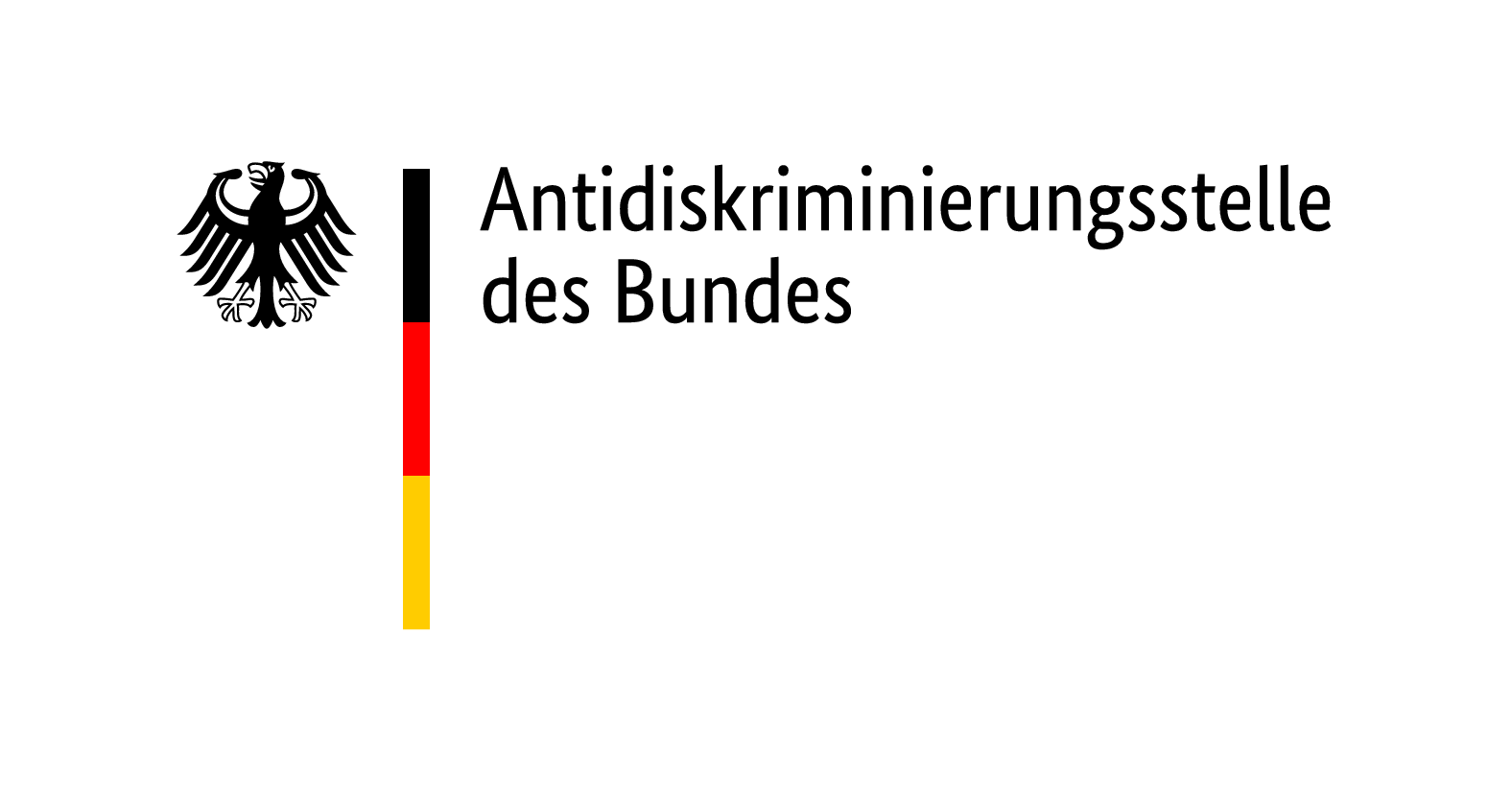FAQs on the survey “Discrimination in Germany” – Answers to frequently asked questions
The survey is aimed at getting facts and data on these questions:
- Where do people in Germany experience discrimination?
- How do they deal with it?
- Which types of support do they use, which ones do they lack?
- What are the consequences of discrimination?
The survey thereby ties onto the Diskriminierungserfahrungen in Deutschland (Discrimination Experiences in Germany) study from 2017. Back then, over 17,000 people took part. The Federal Anti-Discrimination Agency’s first major survey on discrimination made clear, for instance, to what extent discrimination can impact opportunities in the labour market. This insight was taken up by policymakers, public authorities and counselling centres.
The new results are to provide a current and informed basis to develop and fine-tune targeted measures against discrimination. The aim is to achieve tangible improvements in everyone’s lives.
Facts and data on discrimination are important for three reasons:
- They make discrimination visible. This makes clear that it’s a societal problem and does not just concern isolated cases or personal sensitivities.
- They provide a basis for policies and practice. Facts and data help to develop and fine-tune targeted measures against discrimination – such as counselling services, legal changes or training programmes.
- They encourage public debate. The last survey in 2015 already triggered discussions that still continue to have an impact today, for instance to what extent discrimination can adversely affect opportunities in different areas of people’s lives, such as at work, in school or in the housing market.
The questionnaire was developed by IMAP GmbH – supported by around 400 organisations and experts from groups affected by discrimination as well as a scientific advisory committee.
IMAP GmbH is conducting the “Discrimination in Germany” survey on behalf of the Federal Anti-Discrimination Agency.
The survey was commissioned by the Federal Anti-Discrimination Agency and is being conducted by IMAP GmbH.
The Federal Anti-Discrimination Agency is an independent public body. It supports people affected by discrimination, informs people on what discrimination is and what can be done against it, conducts scientific research and submits reports to the German Bundestag. Go to the website of the Federal Anti-Discrimination Agency
IMAP GmbH is a systemic organisational consultancy and an evaluation institute with locations in Düsseldorf and Berlin. One main priority of its work is discrimination-sensitive research as well as the design and implementation of survey and participation processes. Go to the IMAP GmbH website
Anyone aged 14 or above, who has experienced discrimination in Germany, can take part in this survey.
If you need legal advice on a discrimination or want to report it, please get in touch with our counselling team. On the website of the German Anti-Discrimination Association (advd), you can also search for a counselling centre near your home.
Anyone aged 14 or above, who has experienced discrimination in Germany, can take part in this survey. Your experiences are important too, since the results of the survey should help improve the protection from violence and discrimination – for instance at schools, in public authorities or in daily life.
In order to ensure your parents are well-informed, we have prepared some parental information. There you will find all the important details, for example concerning data protection. Please show them this information before you participate in the survey.
You can participate in the survey if in the last two years in Germany you were disadvantaged or treated unfairly in comparison to others. For example
- for racist or antisemitic reasons,
- because you have a disability or chronic illness,
- due to your appearance,
- due to your gender,
- due to your sexual orientation,
- due to your age or
- due to your religion.
Sexual harassment is also classed as discrimination. We want to know what you experienced.
By the way: In Germany, there is a law against discrimination, namely the General Equal Treatment Act (AGG). It prohibits certain types of discrimination in specific areas of life. For instance, the AGG applies in case of sexual discrimination in the workplace, if you do not get a flat on account of your headscarf or if your employment contract will not be made permanent on account of your disability. In case of violation of the AGG, you may be entitled to damages and/or compensation.
If you need legal advice on a discrimination or want to report it, please get in touch with our counselling team. On the website of the German Anti-Discrimination Association (advd), you can also search for a counselling centre near your home.
The easiest way for you to participate in the survey is by filling out the online questionnaire. You can also do so using our interactive chatbot.
If you prefer to fill out a paper-based questionnaire, you can order a questionnaire in German language or in plain German language. It will be sent to you in the post. The return postage to us is free of charge.
The survey runs from November 2025 until February 2026. During this period, you can participate online or fill out a paper-based questionnaire.
On average, it takes approximately 30 minutes to answer all the questions.
In one section of the survey, you are asked to answer in your own words questions concerning a specific discrimination experience. Depending on the amount of detail you wish to provide, you may need longer or shorter to answer this question.
You can interrupt the survey at any time and return to it later.
The survey centres around a specific discrimination experience that you have had. You will be asked, for instance, what exactly occurred, what consequences it had and whether you sought support.
Some questions you will need to answer in your own words by entering your answer into a text field. For some other questions, you are given a number of suggestions from which to select one or several possible responses that apply to you. You will, for instance, be asked how often you experienced discrimination in the last few years, how you evaluate various measures against discrimination and how old you are.
Note: You decide for yourself what you wish to answer. If you do not wish to answer a question, you can simply skip it.
Yes. All data will be handled completely confidentially. The results will be evaluated and published exclusively in anonymised form. You do not need to provide your name nor any other information through which it could be possible to identify you directly.
Note: Some questions you will need to answer in your own words by entering your answer into a text field. Here we recommend you take care not to write anything through which you or other people could be identified, so no full names or addresses, for example.
You can download the information on data protection here: PDF download Data protection
The survey is available in German, English, French, Turkish, Arabic, Spanish, Russian, Polish, Ukrainian as well as in German sign language and in plain German language.
The online survey is compatible with text-to-speech software and the font size can be customised. Furthermore, the online survey is available in plain German language and in German sign language.
The paper-based questionnaire is also available in plain German language.
This is how the data you provide in the questionnaire will be used for research on discrimination in Germany:
- All data that you provide in the survey will be anonymised. In other words: Any personal information that could be traced back to your identity will be removed. No one will be able to work out who provided a specific answer.
- Anonymised data from all the people participating in the survey are analysed by researchers. We expect to publish the main findings in our final report in the early summer of 2027.
- From 2027, interested organisations from civil society will upon request be able to use the anonymised data for their own evaluations. For instance, an organisation that advocates for the interests of a particular group of the population may receive a partial dataset to find out more about this group’s experiences of discrimination. Or an anti-discrimination organisation from a specific Federal Land can request a partial dataset to specifically evaluate which forms of discrimination are most common in their Federal Land. Such special civil society assessments complement the final report.
- In the long term, the anonymised data will be transmitted to a Research Data Centre. There they are put at the disposal of research to also be used to answer questions surrounding the topic of discrimination in the future.
Your data will therefore not only assist the research of today, but also of coming years.
If you want to know when the final report is published, you can register here for an email notification (in German and English).
You can download the information on data protection here: PDF download Data protection
We expect to publish the main findings in a final report in the early summer 2027. The report will also contain recommendations to policymakers and other stakeholders on how better to address discrimination in Germany. Using this approach, the results should help spark a political and societal debate on discrimination.
If you want to know the outcomes of the survey and when the final report will be published, you can activate an email notification here (in German and English).
Alternatively or additionally, you can subscribe to our email newsletter or follow the Federal Anti-Discrimination Agency on LinkedIn, Instagram or Facebook. There you will receive all the latest news from the Federal Anti-Discrimination Agency (in German).
It is important that as many people as possible participate in the survey by the end of February 2026 – that is the only way to ensure our results are reliable. We would be delighted for you to motivate others to participate. Feel free to use any of our various materials free of charge:
If you have been subjected to discrimination and wish to know whether and how you can take action, we recommend you seek counselling. You can find an anti-discrimination counselling centre in your area on the website of the Federal Anti-Discrimination Agency: go to the counselling centre search.
Note: In Germany, there is a law against discrimination, namely the General Equal Treatment Act (AGG). It prohibits certain types of discrimination in specific areas of life. For instance, the AGG applies in case of sexual discrimination in the workplace, if you do not get a flat on account of your headscarf or if your employment contract will not be made permanent on account of your disability. In case of violation of the AGG, you may be entitled to damages and/or compensation.
Unfortunately, there are also cases of discrimination where the AGG cannot help. For instance, the law does not apply if you were discriminated against by a public body or if you are bullied at work about your weight.
If you want to find out whether your discrimination experience falls under the AGG, you can use the discrimination tool on the website of the Federal Anti-Discrimination Agency: go to the discrimination tool (in German).
In the next step, you can for instance receive initial legal counselling concerning the AGG from the Federal Anti-Discrimination Agency (in German, English, Arabic and in German sign language) free of charge.

